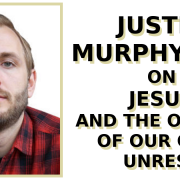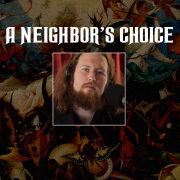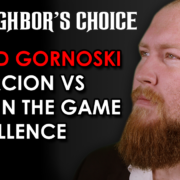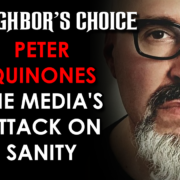The ‘Starry Night’ house: A win for freedom
This classic article by David Gornoski was originally published at WND.com on August 2, 2018.
In the coldness of space, a star explodes. It creates a dazzling shock wave of cloud debris with a magnetic alignment resembling spokes on a cosmic bicycle wheel of light.
We here on Earth call it SuperNova 1987A. But the name does not do it justice. It is an unfolding grand orchestra of vibration that ripples over human drama with wild indifference.
Turning our eyes to our home, we see Earth. Inside this blue grain of sand and water, creatures are busy.
In my home state of Florida, I meet a quiet, determined lady named Nancy Nemhauser to interview on my “A Neighbor’s Choice” radio show. She has good news, but her face is war-weary. Her town of Mount Dora, Florida, just a few miles from where we meet, has decided to drop its multi-thousand-dollar citation against her home.
Mount Dora is a an artsy little hamlet known for its murals and art festivals. A year ago, Nancy and her husband, Lubomir, decided to paint their house wall in interpretation of Vincent van Gogh’s famous “Starry Night” painting. They had no home owners’ association. They checked with city code, and no issue was raised. Yet after they painted the wall, they received a city citation claiming the art was graffiti – that the wall had to match the color of the house. So the couple decided to paint the whole house to match to avoid any issue.
This gesture – painting their home in the style of “Starry Night” – was not received well by the city magistrates. They began to issue rolling hundred-dollar fines for every day the Nemhausers failed to comply with their demands.
Nancy and Lubomir commissioned the mural as a gift to their son, who has autism. They found that the “Starry Night” painting was a particular source of comfort and fascination for the young man. Also, in instances in which he might get lost from home, his difficulty in communication could be overcome by saying “Van Gogh house” to a person looking to help who knows the landmark.
Star explosions produce shock waves of light. Parents protect their children and want them to sleep well. This is the way the world was meant to be.
Some nights, Nancy will catch her son watching the star lights on the balcony in wonder.
Life on Earth is a whirlwind. The human experience is filled with dreams, hopes, struggles, loss and triumphs. We treasure our time by learning to treat others how we would want to be treated. No pageantry or role playing we perform in government changes this tremendous responsibility.
If I do not like the color scheme of my neighbors’ house, do I have a right to come to their door and demand that they pay me a hundred dollars a day until it is fixed? If they resist long enough, can I bring men with guns to force them out of their home?
Such behavior sounds insane. Because it is.
However, when we form groups, we start to think we can get away with doing really insane or cruel things. Toxic groupthink can be playground bullies mimicking a child’s unique speech pattern. It can also produce groupthink in governments that maintain the right to do things they would find abhorrent to do as an individual – just because a majority of voters in a space hired them.
In the case of Nancy and Lubomir, they violated no law. They were merely victims of an arbitrarily banal exertion of power by busybodies that presume control. However, whether such a code existed or not on paper, the principle at stake here is one that arrests the very nature of what our culture should be.
Should we ever use the threat of theft – an act of violence – to change a person’s nonviolent behavior or choices? Should we have a culture that produces law to coerce people’s expression, personal choices, property use, or means of caring for their children? If there is no flesh-and-blood victim that can be named in a citation or police report about an event, how could we ever accuse a person of a crime or violation?
Who are we – floating on this magnetic marble of land and water – to assert our domination over someone else’s home by demanding their money, the fruits of their finite time on Earth?
Private contracts are mutually agreed covenants that can be enforced if people violate the terms. However, public contracts – the domain of states – are often arbitrarily decided piecemeal based on the ever-changing whims of the people close to power.
No one truly owns a piece of the Earth in any cosmic sense. But so long as we are to live together, humans must live in a way that is harmonious and sustainable: one based on respect for differences and freedom. As long as human beings are not stealing, defrauding, or initiating violence, they should enjoy their lives free from meddling.
Thanks to courage and the Pacific Legal Foundation, Nancy and Lubomir were victorious. Facing a federal battle over constitutional rights and an onslaught of media attention, Mount Dora reached a settlement. As part of the agreement, the mayor publicly apologized in a press conference.
Nancy told me the ordeal cost them greatly in health, stress and many sleepless nights. For painting their house to help their son.
Human busybodies will always exist, but it is our job as role models for future generations never to let law be used in such a farcical way that bureaucrats without skin in the game can weaponize their monopolies to inflict pain on someone else.










Leave a Reply
Want to join the discussion?Feel free to contribute!